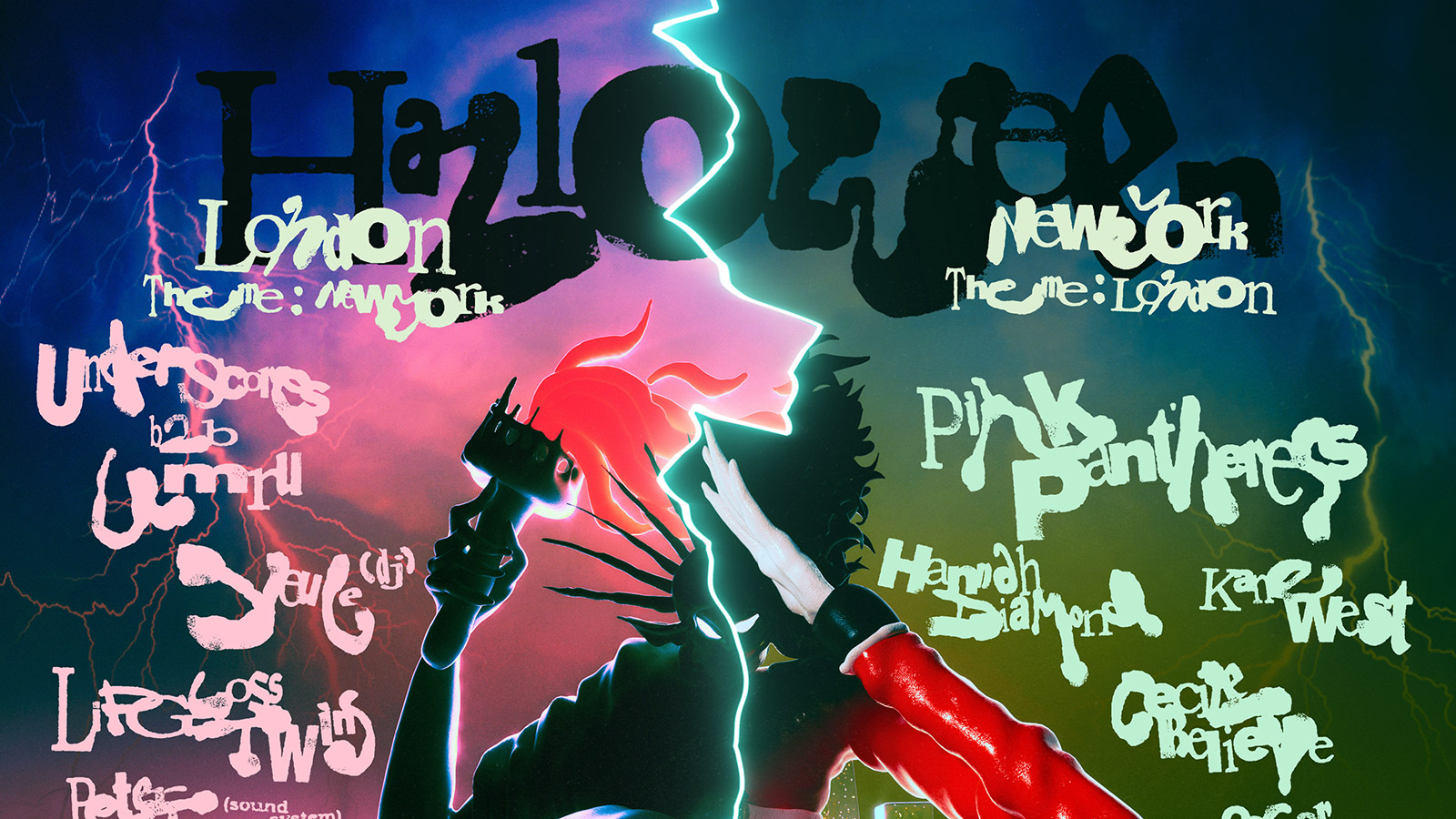

Photography by Jacob Boll
The colour blue comes with a number of dualistic connotations. Simple variations in shade can turn tranquility into melancholy, or dependability into cold mistrust.
For Los Angeles-based singer-songwriter Meg Duffy (they/them) – otherwise known as Hand Habits – blue is more than a hue. It symbolises Duffy’s decision to approach songwriting as more than a method of unpacking grief or revisiting past trauma; instead, using it as a tool to lean into the feelings that come with loving uncompromisingly in the present moment. Duffy’s resolve is carefully documented on Blue Reminder, their new LP which begs the question: what do you do when happiness actually comes knocking?
As Duffy would tell me, the answer is somewhere in the deep, cerulean-tinged duality that flows through the veins of the record. “Shoutout Maggie Nelson,” Duffy laughs, maintaining an unostentatious way about them as they lend credit to the American author, whose book Bluets contemplates love and personal suffering through the colour blue, a framework which resonated with Duffy. “There’s a quote from Bluets – and I’m paraphrasing right now – where Maggie Nelson says that to have just seen something or experienced something is meaningful, and that’s really stayed with me as I’ve been thinking about what [Blue Reminder] means to me,” Duffy reflects.
Though Maggie Nelson provided a point of reference for this refraction, Duffy has their own interpretation. “I like this idea that blue is so associated with melancholy, or reflected as sadness. But it’s actually such a deep colour with so many meanings. The “blue reminder” for myself is many things: past relationships, grief, mistakes, regrets. All of the things that you wish you could change become a compass for how to be more in line with your truth,” they explain. “I often find myself almost feeling guilty or ashamed. I wake up and think, ‘Oh my God, I’m thinking about all the things I’ve ever done wrong.’ But I think that reflects that you care, and that any pain or suffering that I’ve experienced is part of everyday life. I have had love too. And without pain, you can’t have joy.”
Get the Best Fit take on the week in music direct to your inbox every Friday
The title of the record is taken from the track “Blue Reminder”, in which Duffy sings: “Light in the blue of your eyes / Is the blue that reminds me / I’m afraid of losing you / I’ll do anything to prove my love is true / I feel lighter now.” It’s the song that Duffy is most proud of, as it reflects everything that they’ve poured into the record: vulnerability, the ability to show up as the person that they are, and the euphoria that comes with acceptance. The result is an album that defies easy categorisation. While Duffy acknowledges that many of the tracks are “ostensibly love songs,” they're quick to add that “they are love songs through my very specific kind of lens. It is about how falling in love does feel both terrifying and exciting, but this record is about commitment in a lot of ways.” In this case, commitment extends beyond romantic relationships, but is inclusive of a broader sense of authenticity.
Where Duffy’s previous work found itself entangled in heartache, Blue Reminder is a pivot – a conscious choice to find comfort in presence. Having made music as Hand Habits for a decade, this transition required time to nurture. When I ask what led to the change in how they show up for themself through music, what made it possible at this point in their life, Duffy affirms that it was just that: time. “Time is a big factor,” they tell me. “Giving myself permission to sit with the songs, taking my time in writing them and making edits in ways that I didn’t have the confidence to due to internal and external pressures. In the past, I wouldn’t allow myself to question how something turned out and whether I liked it, to scrap recordings or reapproach certain arrangements if they weren’t working.”
Duffy’s newfound patience – previously hindered by the multiple moving parts of the music industry – has expanded their capacity to fully explore ideas. A major breakthrough came through Duffy being able to challenge themself, with one experiment in particular that bore significant influence: a song-a-day challenge organised by Philip Weinrobe, who worked on Duffy’s 2023 EP Sugar the Bruise. “My writing process is very disjointed,” they admit. “It’s not a practice in the colloquial way that everybody talks about their practice. Historically, it’s been very sporadic, and I have a love-hate relationship with it. Sometimes, I won’t write a song for a year or two and I’ll write instrumental music specifically.”

Weinrobe’s challenge compelled Duffy to reassess their approach. “It was a very kinetic challenge, because there were a lot of songwriters and musicians in the group that I deeply admire,” Duffy recalls. “Leslie Feist was in it, and she wrote a lot of songs for her record Multitudes in a different challenge. She’s a friend of mine, but I’m also a huge fan. So, I was going nuts for a week, because I would just work on music all day every day. Ironically, [Leslie Feist] and two other people I really respect dropped out. When they dropped out, that was when I started writing songs that ended up staying on this record, because I wasn’t trying to impress these people. I was writing true to myself.”
Additionally, the experience taught Duffy valuable lessons about feedback and collaboration. “I’m more open to certain types of feedback, and I know not to ask too many people for it,” they say. “It can lead me astray when too many people have opinions, but I now have my go-tos, and I respect their taste and their judgment. With every record, there are always people that you want to impress. But I was fortunate to work with a lot of them on this record.”
Previously, the pressure to impress others that lingered on Duffy’s mind led them to create music that felt uncharacteristic – so much so that they could identify exactly who they were trying to appeal to at the time. While Duffy could joke easily about the possibility of a Hand Habits techno show after reflecting on a time in which they made “German house music about statues,” they appear pleased to have come into their own, while simultaneously appreciating the experiences that brought them to that point.
Get the Best Fit take on the week in music direct to your inbox every Friday
Working with co-producer Joseph Lorge proved to be significant in this regard. “Joseph Lorge was monumental for this record and the way that it sounds and the way that it turned out,” Duffy explains. “We found a good trust thing together, where there were some sessions where he didn’t say much, and that made me trust myself and where things were going. And then some sessions where he was like, ‘This isn’t working.’” This collaborative trust extended to the recording process itself. Most of the album was tracked live with an impressive group of musicians, an approach that felt most honest to Duffy.
“I find that sometimes it’s easier for me to tap into what’s honest when there’s something to respond to,” they explain. “The most profound part of performing or playing music is when there’s people listening. I went to music to feel connected to people.” Even if the emotion doesn’t adequately capture the reality of the situation, Duffy still found that everyone was on the same page. “It’s a big shock when I’ll be like, ‘That was so emotional,’ and everyone is really in the feeling. But it turns out I was singing really out of tune,” they tell me, the humorous recollection accompanied by a more relaxed acceptance of outcomes. “I’ve been pushing myself to not be the only one in control. It’s rare that we’re the only person in control of something, it’s just an illusion. Even when I do have some control, I don’t want all of it. It’s more interesting to relinquish it, and it takes the pressure off.”
Duffy’s ability to be more vulnerable with their collaborators partly came from their experience of touring with Perfume Genius. “Being in Perfume Genius gave me a lot of confidence,” Duffy reflects. “Before I go into any musical situation, whether it’s recording, writing, or performing, there’s always a part of me that’s like, ‘There’s no way I can do this, I won’t be able to handle it.’ At 35-years old, I think I’m just starting to feel like I’ve been doing this for a really long time.”
“I have never done such a bad job that everything’s gone away,” they continue. “But I have scarcity issues. And I was really hyper aware of that going into making this record,” they admit. “I had to trust the people I was working with: my label, the community that I’ve been a part of for the last ten years – people aren’t just doing me a favour because they feel bad for me or something, they want to make music with me. These people want to be involved, so I can rely on them. And I can rely on myself to rise to that.”
In making Blue Reminder, Duffy also willed themself to take another important step into a more confident frame of mind: allowing themself to embrace their voice. “It’s the first time I ever actually had a nice time doing vocals for a record,” they say. “I can feel really self-conscious with my voice. It was never the first thing that I went to when I started playing music, and it’s definitely not the thing I find the most confidence in, but I wanted to make sure that I was singing these songs in a way that had emotion in them, and that the emotion felt connected to the subject matter.”
Delving into the emotional dynamics on Blue Reminder, Duffy has a realisation about how their day-to-day mindset impacts their writing. “Track one on this record is actually a very sweet love song to me; it sounds really sad to me when I listen to it,” Duffy notes, laughing at the irony. They’re referring to opener “More Today”, in which Duffy professes their all-or-nothing love over the grain of thick, heavy dredges of electric guitar – bringing a tenebrous mood to the open-hearted declaration.
“Maybe a therapist would call it ‘emotionally bypassing’,” they say with a wry chuckle. “In the same breath as expressing disappointment, pain, or anger, I have a tendency to say, ‘But on the bright side!’. I have a hard time sitting in true discomfort, and I think that inherently makes its way into my writing.” The emotional bypassing, as they call it, essentially creates songs that hold multiple truths. “My gift and my curse is making even the happiest things I’ve ever written about sound really devastating.”
As a trans and non-binary person, writing about joy and stability carries additional complexity. “It’s so easy for any marginalised people to become the scapegoats of what’s wrong with society,” Duffy explains. “I was aware of how writing songs from a position of pain is very comfortable for me, but if somebody were to look at my catalogue, it would be easy for someone to say, ‘This person is always going through a breakup’ or ‘This person’s always grieving.’”
The stakes of representation weigh heavily. “When I reflect on how society can punish or cruelly imply a brokenness to anyone who lives in the margins of what they consider normal, it’s hard not to internalise some of this way of thinking,” Duffy says. "I don’t want to be reduced to my shortcomings. I see that happening all the time, especially for Black trans women. I’m at the way far end of the spectrum, and I know that, but I don’t want the narrative to be like, queer means broken, or trans means mentally ill.”
Yet, visibility itself presents its own challenges. “Visibility is a very confusing thing for me in general,” Duffy admits. “I’m not gonna try to ever be the Wells Fargo non-binary face of ‘I’m just enjoying my gay life!’. That’s not the message here.” The fear of being tokenised can actually obscure the very joy they’re trying to celebrate. “I’m so self-conscious of being perceived as that, it stops me from noticing when I am actually just feeling good.” This tension between representation and authentic self-expression runs through much of Duffy’s thinking about Blue Reminder. “I’m learning now that I don’t want to play up suffering,” they clarify. “From day to day, I am typically not depressed, and I’m grateful for that. But if you listen to my music, you might think I am depressed. Actually, at the core of my being, I have faith in humanity!”
 Photo by Bronwyn Ford
Photo by Bronwyn Ford
The album navigates this dichotomy with remarkable nuance. On “Dead Rat”, Duffy transforms the mundane horror of a rodent decomposing within apartment walls into a tender meditation on how love provides sanctuary amid life’s messiest moments. Set against restrained guitar and sprightly piano notes, the song culminates in intimate comfort: a partner opening windows, offering embrace, permission to cry. Meanwhile, “Jasmine Blossoms” acknowledges the weight of our current political climate – “Too much darkness / They kill innocent men” – while still insisting we “try to find a little joy” against a level groove accentuated by a smooth saxophone accent. It’s not dismissive positivity, but rather a way of contending with two starkly different realities.
Blue Reminder arrives at a moment when such acceptance feels particularly precious. “With this record – with the exception of some holdovers from when I was writing while suffering – I wanted to be sincere in a way that is uncomfortable for me. I think it’s important for people to see that I’m trans, I’m non-binary. It’s not a good time for that. But I’m also still living a really healthy life that lets me experience pleasure and joy. It’s not all struggle.”
Blue Reminder attests to the power of cherishing both the melancholy and the joy that blue can represent, insisting on the full complexity of life and love. It’s a record that suggests happiness, when it finally arrives, doesn’t have to be simple to be real. As our conversation draws to a close, I ask Duffy about the biggest thing they’ve learned from this process. Their answer is both humble and empowering: “I think I can make something that I'm proud of.”
“I’m at this point in my life where I’ve been very honest with the person that I was, who I’ve been, and I’m not really ashamed of that anymore,” Duffy tells me, seemingly from a place of fulfilment. “Sometimes I still wake up thinking about everything I’ve ever hurt. But Blue Reminder is to say that I carry it all with me.”

 3 weeks ago
16
3 weeks ago
16


















 English (US) ·
English (US) ·